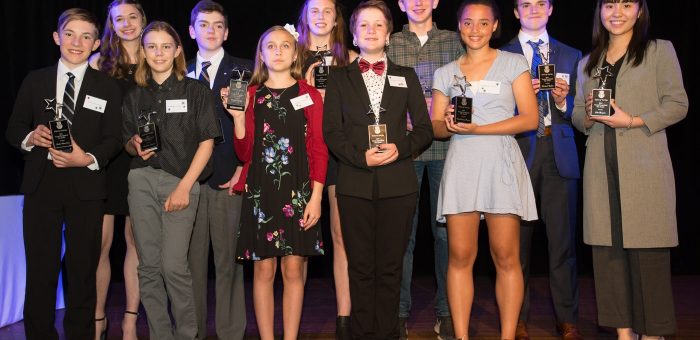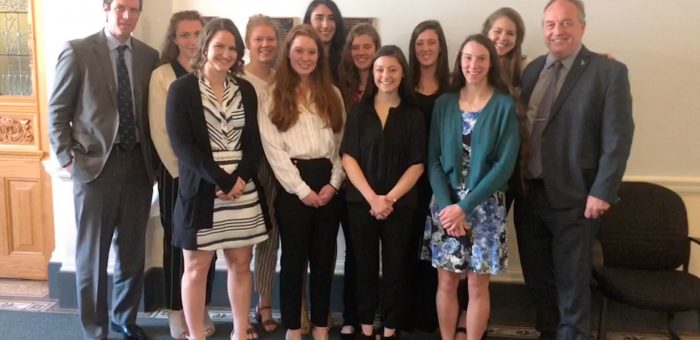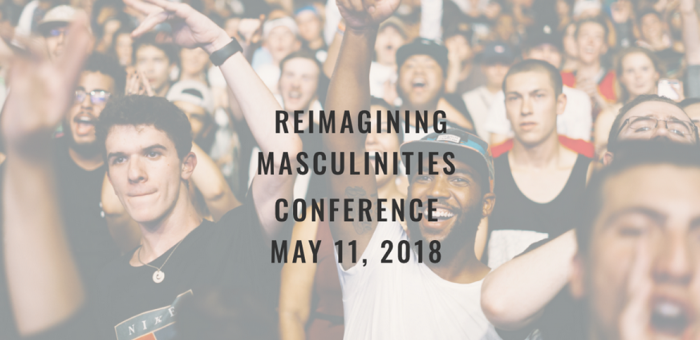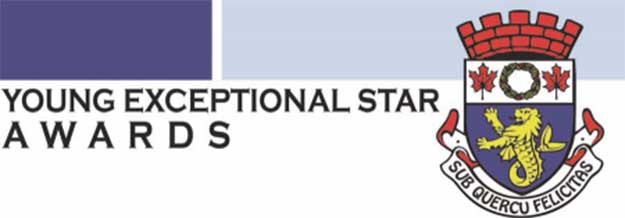Youth
Congratulations to all 2019 Oak Bay Young Exceptional Star (Y.E.S.) Award Winners
Last night I had the privilege of attending the 12th annual Oak Bay Young Exceptional Star (Y.E.S) awards ceremony at the Oak Bay Beach Hotel where 11 exceptionally talented youth in grades 6 to 10 were honoured for their achievements.
As noted by the YES Awards Committee, Chaired by Hazel Braithwaite, that administers the awards, “The goal of the awards is to emphasize the positive achievements of Oak Bay’s young people by recognizing those who have distinguished themselves in such areas as volunteerism, arts, citizenship, academics, athletics and/or who have overcome obstacles to achieve their goals.”
Congratulations to this year’s award winners: Griffin Arnatt, Michael Barber, Sola Dupain, Matthew Hinton, Luka Hurschler, Jessica Hutcheson, Ryan Killoran, MacKenzie Porter, Lauren Rust, Jessica Soule and Margot Wehrle.
I had the pleasure of presenting the award to Ryan Killoran from St. Michael’s University School who was nominated by his teacher Mr. Bell. Below is the text of my speech.
Text of Presentation Speech
A triple threat is not a term that can be given to many 14 year old’s,but Ryan Killoran is well deserving of that title! This year, Ryan was the captain and star of the grade 8 basketball team, the lead in the middle school musical and a model student in the classroom. Mr. Bell – Humanities 8 Teacher and Basketball Coach says that this is his first year teaching and coaching Ryan at St. Michaels University School and he says that he is blown away by the poise and humbleness that Ryan comes into each day with.
On the basketball court, Ryan is a tremendous player who leads by example. He is a very cerebral individual, seeing plays that most cannot at the grade 8 level, which encourages his teammates to play in the same unselfish way. Ryan has shown that he is not only talented enough to play basketball at a high level but that he also possesses the desire to improve and the character needed to be a good teammate and competitor. He is a hard worker in both practice and games and is very coachable.
On stage, Ryan’s talent and confidence shines through. In this year’s middle school musical, Seussical, Ryan earned the lead role of Cat in the Hat and delivered his lines with humor and grace in front of a full crowd at the McPherson Playhouse. Ryan’s performing talents do not stop at his acting abilities however as he is a talented singer and flautist, with an impressive affinity for improvisation in the school’s Jazz Band.
In the classroom, Ryan is a confident and enthusiastic learner who excels in verbal debates and discussions in Humanities class. Ryan provides insight and shows excellent understanding in all aspects of the curriculum while also demonstrating respect to his peers and a willingness to help out around the classroom. Ryan’s report card confirms that his other teachers would tell you the same thing. In addition, he is a role model to younger students as he also participated in the school’s WEB (Where Everybody Belongs) program that welcomes the grade 6 students into the middle school to help with their transition from the Junior School. Ryan epitomizes SMUS’ four leadership pillars – Service, Honesty, Respect and Courage – and has so since he came to the Middle School.
Mr. Bell feels that Ryan is well deserving of the Y.E.S. Award as he excels in all aspects of his school and has the drive and character traits that make anything in his future possible.
Ladies and Gentlemen – please join me in congratulating Ryan Killoran on his achievements!
Introducing the UVic Vikes women’s varsity rowing team
Today in the legislature I had the distinct honour of introducing the University of Victoria Vikes women’s varsity rowing team. I took the opportunity to recognize their success in the 2019 Brown Cup boat race between UVic and UBC which took place in the Gorge Waterway on March 30, 2019. Congratulations UVic Vikes.
Below I reproduce the video and text of my introduction.
Video of Introduction
Text of Introduction
A. Weaver: Today I rise to introduce the University of Victoria Vikes women’s varsity rowing team, who are in the gallery today. For anyone who might not have seen the front page of the Times Colonist Sunday morning, the Vikes women out-rowed UBC Thunderbirds this weekend at the annual Brown Cup race, much to the embarrassment and shame of the member for Vancouver–Point Grey.
The race itself begins under the Tillicum bridge before finishing in the Inner Harbour. The UVic women reached the Inner Harbour nearly ten seconds — that’s almost a lifetime in the sport of rowing — before the member for Vancouver–Point Grey’s Thunderbirds did. Again, more shame and more embarrassment for the member.
The Brown Cup is a UBC-UVic thing. The win for the UVic women extends their all-time Brown Cup record to a dominant — listen to this, Member — 24-3. That’s 24 times UVic has beat UBC on this, and only three times have they lost.
The rivalry between the two programs is intense, and I look forward to following this again next year. I look forward to rising again in the House next year and saying the record is now 25-and-3 and once more pointing out the shame that the member for Vancouver–Point Grey should be feeling.
The names of the winning crew are as follows, and they’re upstairs: Barney William, Sam Heron, Lily Copeland, Piper Battersbee, Jillian Katy, McKenna Simpson, Layla Baluch, team captain Larissa McKinley, Adrianna Rooker, Kirsten Edwards and Danai McCullough. Would the House please make this incredibly talented group of rowers feel very, very welcome.
Implementation of sexualized violence & misconduct policies at BC postsecondary institutions
Budget estimate debates for the Ministry of Advanced Education were held on March 7. I took the opportunity to ask the Minister about the status of government’s review of progress made at British Columbia postsecondary institutions towards the implementation of sexualized violence & misconduct policies.
Below I reproduce the text and video of the exchange. As you will see from the response, government has established a working group comprising of students, institution staff and a community organization resource was convened in December 2018.
The working group reviewed the feedback received and provided input to the development of a draft action plan for the minister’s consideration. Review of institution policies was an area considered by the working group.
Video of Exchange
Text of Exchange
A. Weaver: Thank you to the minister for the answer. My final area for canvassing is with respect to the Sexual Violence and Misconduct Policy Act that was brought in under the previous government. Under the act, the minister can direct a post-secondary institution to conduct a survey or to review its sexual misconduct policy in order to determine its effectiveness.
We’re aware that a survey was actually done on the effectiveness of this legislation and post-secondary policies. So my question is…. I’ve a number of questions here. Are there plans for a more substantial review of these policies in the future, and if yes, what is the timeline for that?
Hon. M. Mark: I thank the member opposite for the question. I first want to acknowledge his advocacy. I want to acknowledge the former government’s efforts to put a law into place. I want to acknowledge that these steps will lead, hopefully, to better safety and outcomes for people.
Most of the institutions formalized their policies in 2017, and the legislation requires institutions to review their policies every three years, whether the minister directs it or not. Most institutions will be undertaking reviews prior to May 2020. These reviews are required to include student consultation. Institutions are responsible for the review of their policies in determining what amendments or additions may be needed to best meet the needs of their students and campuses.
Further to the survey that was undertaken by the ministry as part of an outreach engagement campaign in the winter of 2017-2018 after we formed government, a working group comprised of students, institution staff and a community organization resource was convened in December 2018.
The working group reviewed the feedback received and provided input to the development of a draft action plan for the minister’s consideration. Review of institution policies was an area considered by the working group. We will be working closely with the institutions over the next several months to further explore next steps.
I can assure the member opposite that recommendations are being drafted as we speak. I’m anxiously awaiting what the students and the working group has had to say. We as a government are committed to moving forward to ensure that we address student safety on campus.
The Chair: Member, and noting the hour.
A. Weaver: I must note the hour, hon. Chair. I would suggest that, perhaps, it is appropriate for the minister to note said hour, and I’ll take my place and allow it.
The Chair: Go ahead with your question. Just that this will likely be the last question.
A. Weaver: I will make a comment. I appreciate the answer from the minister. Of course, different institutions have a different capacity to actually introduce and enable these sexualized violence and misconduct policies. Some institutions have been more successful than others.
We have also undertaken an attempt to receive feedback from various institutions across the province, particularly of student groups. There is differing and varied implementation, and I certainly look forward to the recommendations coming forward from that group, because there is a lot of work that needs to be done.
Of course, as the minister will know, institutions do not want sexualized violence issues to be public because institutions want to be branded safe institutions for their student body. There’s an inherent desire to keep this under the radar, so to speak, and one of the purposes of introducing the policy measures last time was to ensure that institutions grapple with the very real problem that’s ongoing. I look forward to the results.
In September, the ministry began an information campaign. This campaign featured posters that implied that rape culture is wrong. These posters, however, were not very informative. Students need information about the supports that are available to them.
I had a series of questions here. I can just toss them all out at the same time, because the minister should’ve received these in advance. Who did the ministry consult in the design of these posters? Will this information campaign be continuing next year? Will there be a substantive review of the effectiveness of this campaign? How will the ministry incorporate support resource information into the posts going forward?
Hon. M. Mark: Again, thank you for raising the important issue. If we’re talking about making systemic change, we have a law. The law led to policies. The policies, when I came on as minister, were found on some websites — if you had a password or not. I’m not trying to be critical, but I didn’t think it was good enough to have policies on a website that means nothing to students.
We wanted to reach out to students who told me as minister, when I visited all of the campuses, that this was a serious issue. And it’s one that takes great courage for people to come forward to say: “I’ve been a victim.”
Regardless of who you are, I’m not telling you what the face is. That was the point of the campaign. The campaign was: we don’t know what that face is, and let’s not generalize. Let’s not stereotype that it’s a guy or girl.
Part of the idea of Tinder…. I’m not familiar with Tinder; I’m married, for those of you watching at home. Tinder — you know, swipe right, swipe left. That was the idea. The idea was to try to capture a younger audience. I’m not 22. I’m not going to university anymore, where we know that young people are on their phones. And we wanted a campaign that was going to be somewhat provocative.
I heard from students, who said: “Hey, we weren’t really expecting this from the minister.” It was a step and a strategy that we’re doing. We have a working group that is giving us as a ministry a lot of suggestions and recommendations and advice on what we should do to address this very, very serious issue. But when it comes time for the campaign…. The campaign was timed to meet the highest points of risk, the first two weeks of school. We launched the campaign again in January, with the highest points of risk in school.
I can’t answer your question about whether or not we will relaunch the same campaign. I’m taking direction advice from the students who have taken their time to tell me how we should address this systemic issue. There will be more to come, but that was, in essence, the premise of how we came up with the campaign. Was it enough? We wanted a campaign that could speak for itself. Part of it was to get people talking.
Noting the hour, I move that the committee rise, report completion of the resolution of the Ministry of Children and Family Development, report progress on the Ministry of Advanced Education, Skills and Training and ask leave to sit again.
Reimagining Masculinities Conference 2018
Today I had the distinct honour of providing the opening remarks at the Reimagining Masculinities Conference 2018 held at the University of Victoria.
As noted on the conference website:
ReImagining Masculinities is cultivating meaningful conversations about healthy, non-violent masculinities. Our hope is to inspire empathy, action, and self-reflections through conversation, education, and awareness.
Online streaming of the conference is also available.
Below I reproduce the text of my opening remarks.
Text of Opening Remarks
Opening statement – Reimagining Masculinities
Thank you everyone for being here today to explore an issue that isn’t often discussed in such a public setting.
I’ve been given the opportunity to say a few words about Reimagining Masculinities and as both a professor at UVic and MLA for this riding, it is my absolute pleasure to do so.
Please keep in mind that I teach climate science rather than gender studies, but I will do my absolute best.
This conference is such an accomplishment, not only because of the topic, but because of the breadth of talent represented as well.
Paul Lacerte has many fans in the legislature who are proud to wear their moosehide campaign pins and I hope everyone here today will pledge to get involved.
We could surely all benefit from more poetry in our lives and I know Councillor Jeremy Loveday will show that politicians can have a way with words.
The links between Tanille Geib’s Healthy Relationships workshop and Allan Wade’s analysis of colonial masculinities show just how complex this topic really is.
When I consider toxic masculinity, it is not hard to make connections to the events that we hear about every single day.
Whether it’s disgraced actors or the tragedy in Toronto, the MeToo movement has highlighted just how big an impact toxic masculinity has on all of us.
It’s possible that until recently a lot of men may not have realized the extent of abuse that women have always had to deal with.
On the other hand, I want to avoid the idea that the only role men can play in the movement is of the accused.
This conference is a prime example of the role that men can play in addressing this problem, and it’s something that I have always tried to do as an MLA.
Through collaboration with the previous government, I was able to ensure that legislation passed to require all universities and other postsecondary institutions in British Columbia to implement comprehensive sexualized violence and misconduct policies.
My hope was that survivors of sexualized violence on campus would be better supported by their schools, and that the process would be more transparent for all involved.
Based on our initial consultations it appears as though this has been the case. I thank Kayla Phillips, who has been working diligently in our BC Green Caucus as a legislative intern.
She has been spearheading our efforts to determine the effectiveness of the legislation that we introduced two years ago.
I was also able to introduce and get implemented a law that banned employers from requiring their employees to wear high heels which had been a problem particularly in jobs like serving where women have traditionally been subject to high levels of sexual harassment.
While it has not righted all wrongs in the industry, I have spoken with many women who are happy to no longer fear losing their job for refusing to wear painful footwear.
This conference also highlights the importance that intersectionality plays when considering toxic masculinity. This is not simply an issue of masculine men and feminine women, but a whole spectrum of those with varying identities impacting their own experiences.
I encourage anyone involved in tackling toxic masculinity and its effects to think outside our standard binaries for innovative solutions, such as we have here today.
I would like to thank hosts Scott Thompson & Steven Hao as well as the organizers, including Nick Sandor, for asking me to speak today.
I’d now like to introduce Member of Parliament for Winnipeg South and Parliamentary Secretary for the Status of Women, Terry Duguid.
Terry’s appointment in this role is a great example of how the status of women in Canada is not a responsibility that rests solely with women, and the part that everyone has in addressing it.
While Terry can’t be here in person, he can tell you more about his role through this video:
I’m also lucky enough to be joined by MLA for Esquimalt-Metchosin, Mitzi Dean. Mitzi was recently named Parliamentary Secretary for Gender Equity in BC and it’s hard to imagine a better choice for that role in the legislature.
Before her election last year she had spent many years advocating for women and children in various parts of the world and with the U.K.’s largest child protection charity. She now brings that experience to share with you today.
Congratulations to all 2018 Oak Bay Young Exceptional Star (Y.E.S.) Award Winners
Last night I had the privilege of attending the 11th annual Oak Bay Young Exceptional Star (Y.E.S) awards ceremony at the Oak Bay Beach Hotel where 10 exceptionally talented youth in grades 6 to 10 were honoured for their achievements.
youth in grades 6 to 10 were honoured for their achievements.
As noted by the YES Awards Committee, Chaired by Hazel Braithwaite, that administers the awards, “The goal of the awards is to emphasize the positive achievements of Oak Bay’s young people by recognizing those who have distinguished themselves in such areas as volunteerism, arts, citizenship, academics, athletics and/or who have overcome obstacles to achieve their goals.”
Congratulations to this year’s award winners: Lily Cave, Zach Charlseworth, Leo Mohsenzadeh-Green, Reed Greenwood, John Horwood, Tessa Jones, Talia Pike, Lachlan Stewart, Rebecca Stone, and Lidya Townsend
I had the pleasure of presenting the award to Zach Charlesworth from Oak Bay High School who was nominated by his teacher Nichelle Garraway. Below is the text of my speech.
Text of Presentation Speech
Nichelle Garraway, who coordinated the nomination for Zach Charlesworth, a grade 10 student at Oak Bay High School, descibes him as a spectacular young man.
He leads his classmates effortlessly and with an enthusiasm that is contagious. His teachers speak highly of him as a ‘well-rounded’ student and his peers often look to him for support and guidance, which he is always willing to give freely.
He is a kind and caring individual, working hard to make those around him feel welcome in their school and their community.
Zach is an exceptional student not only in his academics, but also in his comportment.
Zach’s most recent report card was superb. He achieved an ‘A’ in all of his courses and above 95% in seven classes.
His teachers all appreciate his willingness to ask questions and delve into the subject matter on a variety of different levels.
It is no easy feat to maintain grades such as these, especially considering Zach has a very busy schedule playing hockey outside of school as well.
Zach has the ability to converse and work with anyone and everyone, finding something in common with any student in the classroom.
He works very hard to ensure that he submits work of the highest quality in all of his classes and has a genuine passion for learning that inspires others to foster a curiosity within themselves.
Zach’s athletic prowess is not to be overlooked. Zach has played hockey at a very competitive level for many years, even travelling with his team to the provincial championships in Fort St. John this past spring break.
His commitment to the sport of hockey and to his team exemplifies his dedication. He dedicates many hours to practice, to travel and to game play, yet he still manages to arrive to school every day with his work completed at a high quality and excited to learn.
Zach is well known for his creativity and sense of humour both in and out of the classroom. At any given moment, he is sure to be cracking a joke with his teammates, his classmates, even when giving a presentation in French.
Aside from his natural athletic talent, Zach is also a natural leader and deserves to be recognized as such. His positive attitude and genuine charisma contribute to make the school and his community a better place.
There’s no doubt that we’ll continue to celebrate Zach’s success as he influences the Oak Bay community and the world with his kindness and leadership.
I am delighted to be able to present this young man with a Young Exceptional Star award – he is certainly deserving of it!
Please help me to congratulate Zach.








